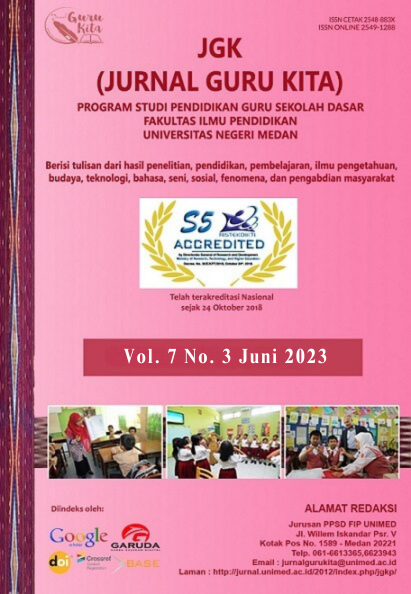UPAYA MENINGKATKAN HASIL BELAJAR MELALUI MEDIA LINGKUNGAN SEKOLAH ( MEDLINGSEK ) DAN METODE OBSERVASI BAGI SISWA KELAS IV SD.NEGERI 132409 KOMPETENSI SUMBER DAYA ALAM TAHUN PELAJARAN 2022/2023
DOI:
https://doi.org/10.24114/jgk.v7i3.47496Keywords:
Learning Outcomes, School Environment Media, Observation MethodsAbstract
Efforts to Improve Learning Outcomes Through School Environment Media (Medlingsek) and Observation Methods for Grade IV SD Students. Country 132409 Competence in Natural Resources for the 2022/2023 Academic Year. This study aims to find out: 1) To find out whether the use of MEDLINGSEK (School Environmental Media) can improve student learning outcomes in science learning on natural resources material in class IV SD Negri 132409 Tanjung Balai City. 2) Identify problems that occur in the science teaching and learning process in class IV SD Negri 132409 Tanjungbalai City. The research subjects were Grade IV students of SD Negri 132409 Tanjungbalai City. Research location for grade IV State Elementary School - 132409 Jalan MT. Haryono. The research method uses Classroom Action Research (CAR). The results showed that the average student score during the Preliminary Test was 63.38% with learning completeness of 46.42%, but after the action was taken in cycle I, the average learning outcomes of 53.57% where 15 students or 64.63% of students have reached the level of mastery of learning (total score of 70). (total value 70). Thus, the use of the MEDLINGSEK (School Environment Media) observation method can increase students' reasoning to understand science lessons more easily and clearly because they are learned directly through seeing and experiencing directly by the students themselves.References
https://www.kompasiana.com/rohmatullayli5bpai9777/5f699335dd394369d4610a62/lingkungan-sebagai-media-pembelajaran.
https://www.google.com/search?q=pengertian+hasil+belajar&rlz=1C1VDKB_enID982ID982&oq=pengertian+hasil+belajar&aqs=chrome..69i57j0i512l7.8442j0j15&sourceid=chr https://www.zonareferensi.com/pengertian-hasil-belajar/
Abdurrahman, M. 1999, Pendidikan Bagi Anak Berkesulitan Belajar, Penerbit Rineka Cipta. Jakarta.
Arikunto, Suharsini,2008, Penelitian Tindakan Kelas, Penerbit Bumi Aksara, Jakarta.
Arsyad, Azhar, 2000, Media Pengajaran, PT Raja Grafindo Persada, Jakarta.
Aqib, Zainal. 2008. Penelitian Tindakan Kelas Untuk Guru SD, SLB, dan TK. Yrama Widya : Bandung.
Baharuddin, dkk. 2007. Teori Belajar dan Pembelajaran. Ar-Ruzz Media, Jogjakarta.
Bundu, Patta. 2006. Penelitian Keterampilan Proses dan Sikap Ilmiah Dalam Pembelajaran Sains Sekolah Dasar. Depdiknas: Jakarta.
Djamarah, Dkk, 1996, Strategi Belajar Mengajar, Penerbit Rineka Cipta, Jakarta.
Hamzah, B Uno, 2005, Orientasi Baru Dalam Psikologi Pembelajaran, Penerbit Bumi Aksara, Jakarta .
Haryanto, 2006, Buku Pelajaran Sains Untuk Kelas IV SD, Erlangga: jakarta.
Muhibbinsyah, 2004, Psikologi Pendidikan Dengan Pendekatan Baru, Penerbit Remaja Rosda Karya, Bandung.
Mulyasa, E, 2007, Menjadi Guru Profesional (Menciptakan Pembelajaran Kreatif dan Menyenangkan).Penerbit Remaja Rosdakarya, Bandung.
Munandar, dkk, 2003, Psikologi Belajar, Penerbit Raja Grafindo Persada, Jakarta.
Roestiyah NK, 1998, Strategi Belajar Mengajar,Penerbit Rineka Cipta, Jakarta.
Sagala Saiful, 2003, Konsep Dan Makna Pembelajaran, Penerbit Alfabete, Bandung.
Samatoa, Usman. 2006. Bagaimana Mengajarkan IPA di Sekolah Dasar. Depdiknas: Jakarta
Sanjaya Wina, 2006, Strategi Pembelajaran Berorientasi Standar Pendidikan, Penerbit Kencana, Bandung.
Slameto, 2003, Belajar Dan Faktor-Faktor Yang Mempengaruhinya, Penerbit Rineka Cipta, Jakarta.
Suryosubroto, 1996, Proses Belajar Mengajar Disekolah, Penerbit Rineka Cipta, Yogyakarta.
Sutikno Sobri, 2009, Belajar Dan Pembelajaran, Penerbit Prospect, Bandung.
Downloads
Published
How to Cite
Issue
Section
License
Authors published with the JGK (Jurnal Guru Kita) agree to the following terms:
- Authors retain copyright and grant the journal the right of first publication with the work simultaneously licensed under a Creative Commons Attribution License (CC BY-SA 4.0) that allows others to share the work with an acknowledgment of the work's authorship and initial publication in this journal.
- Authors are able to enter into separate, additional contractual arrangements for the non-exclusive distribution of the journal's published version of the work (e.g., post it to an institutional repository or publish it in a book), with an acknowledgment of its initial publication in this journal.
- Authors are permitted and encouraged to post their work online (e.g., in institutional repositories or on their website) prior to and during the submission process, as it can lead to productive exchanges, as well as earlier and greater citation of published work. (See The Effect of Open Access)


























